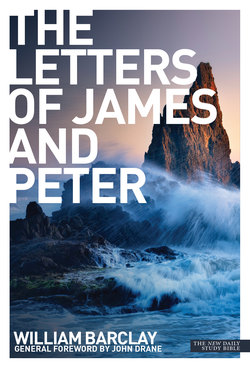Читать книгу New Daily Study Bible: The Letters to James and Peter - William Barclay - Страница 22
На сайте Литреса книга снята с продажи.
ОглавлениеAVOIDING RESPONSIBILITY
James 1:13–15 (contd)
FROM the beginning of time, it has been a human instinct to blame others for our own sin. The ancient writer who wrote the story of the first sin in the Garden of Eden was a first-rate psychologist with a deep knowledge of the human heart. When God challenged Adam with his sin, Adam’s reply was: ‘The woman whom you gave to be with me, she gave me fruit from the tree, and I ate.’ And when God challenged Eve with her action, her answer was: ‘The serpent tempted me, and I ate.’ Adam said: ‘Don’t blame me; blame Eve.’ Eve said: ‘Don’t blame me; blame the serpent’ (cf. Genesis 3:12– 13).
Human beings have always been experts in evasion. Robert Burns wrote in ‘A Prayer in the Prospect of Death’:
Thou know’st that Thou hast formed me
With passions wild and strong;
And list’ning to their witching voice
Has often led me wrong.
In effect, he is saying that his conduct was as it was because God made him as he was. The blame is laid on God. So we blame one another, we blame our circumstances, we blame the way in which we are made, for the sins of which we are guilty.
James sternly rebukes that view. To him, what is responsible for sin is a person’s own evil desire. Sin would be helpless if there was nothing in human beings to which it could appeal. Desire is something which can be nourished or stifled. It can be controlled and even, by the grace of God, eliminated if dealt with it at once. But people can allow their thoughts to follow certain tracks, and their steps to take them into certain places and their eyes to linger on certain things, and so stimulate desire. They can so hand themselves over to Christ and be so engaged on good things that there is no time or place left for evil desire. It is idle hands for which Satan finds mischief to do; it is undisciplined minds and uncommitted hearts that are vulnerable. If someone encourages desire for long enough, there is an inevitable consequence. Desire becomes action.
Further, it was the Jewish teaching that sin produced death. The Life of Adam and Eve says that the moment Eve ate of the fruit she caught a glimpse of death. The word which James uses in verse 15, and which the Authorized and the Revised Standard Versions translate as brings forth death, is an animal word for birth; and it means that sin spawns death. Overcome by desire, human beings become less than human and sink to the level of animals.
The great value of this passage is that it urges upon us a personal responsibility for sin. No one was ever born without desire for some wrong thing. And, if we deliberately encourage and nourish that desire until it becomes fully grown and monstrously strong, it will inevitably result in the action which is sin – and that is the way to death. Such a thought – and all human experience admits it to be true – must drive us to the grace of God, which is the only thing that can make and keep us clean, and which is available to all.
